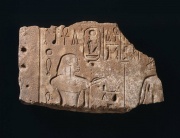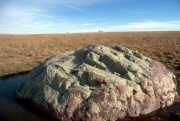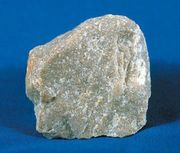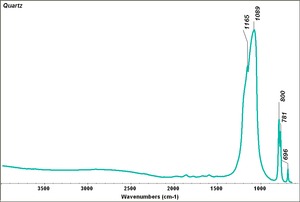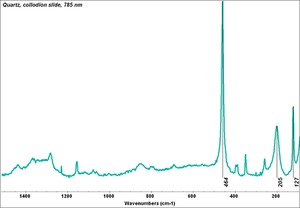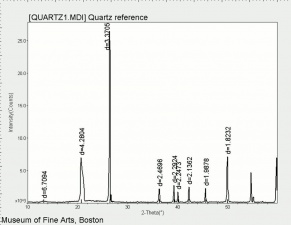Difference between revisions of "Quartzite"
m (Text replace - "\[http:\/\/cameo\.mfa\.org\/materials\/fullrecord\.asp\?name=([^\s]+)\s(.*)\]" to "$2") |
|||
| (4 intermediate revisions by the same user not shown) | |||
| Line 1: | Line 1: | ||
| − | [[File:10.650-E6225CR-d1.jpg|thumb|]] | + | [[File:10.650-E6225CR-d1.jpg|thumb|Quartzite relief<br>MFA# 10.650]] |
== Description == | == Description == | ||
| − | A metamorphic rock composed of [[quartz|quartz]] grains. Quartzite is commonly found throughout the world. It is usually white in color but can be found in other colors as | + | A metamorphic rock composed of [[quartz|quartz]] grains along with other minerals such as [[hematite]], phengite, and [[chlorite]]. Quartzite is commonly found throughout the world. It is usually white, pink or red in color but can be found in other colors, such as yellow, green, blue or orange. Quartzite is a semitransparent stone that resembles [[marble|marble]], although it is harder and does not effervesce in [[acid|acid]]. Quartzite breaks unevenly with a clean angular fracture and is very resistant to weathering. Since prehistoric times it was used to make tools. Presently, natural quartzite is used as a decorative stone in flooring, walls and countertops, and crushed quartzite is used for making [[brick|brick]], [[abrasive|abrasives]], and road rubble. Dyed quartzite has been used to replicate several types of gemstones. Sedimentary quartzite is generally called siliceous [[sandstone|sandstone]] to distinguish it from the [[metamorphic|metamorphic]] stone. |
| − | |||
[[File:SiouxQuartzite.jpg|thumb|Sioux Quartzite glacial erratic]] | [[File:SiouxQuartzite.jpg|thumb|Sioux Quartzite glacial erratic]] | ||
| + | [[File:Quartziteemr1.jpg|thumb|Quartzite]] | ||
== Synonyms and Related Terms == | == Synonyms and Related Terms == | ||
arenite sandstone; siliceous sandstone; cuarcita (Esp.); quartzite (Fr.); quartzito (Port.); Quarzit (Deut.); kwartsiet (Ned.) | arenite sandstone; siliceous sandstone; cuarcita (Esp.); quartzite (Fr.); quartzito (Port.); Quarzit (Deut.); kwartsiet (Ned.) | ||
| + | [[[SliderGallery rightalign|Quartz.TIF~FTIR (MFA)|Quartz, collodion slide, 785 nm copy.tif~Raman (MFA)|QUARTZ1.jpg~XRD (MFA)]]] | ||
| + | == Risks == | ||
| − | + | * Noncombustible. | |
| − | + | * Inhalation of fine particles may cause silicosis. | |
| − | + | * US Silica Company: [https://www.ussilica.com/sites/default/files/2019-05/Silica%20OSHA%20GHS%20SDS%20%288-17%29.pdf SDS] | |
| − | + | == Physical and Chemical Properties == | |
| − | |||
| + | * Insoluble in acids except for hydrofluoric acid. Slightly soluble in alkalis. | ||
| + | * Trigonal crystal system | ||
| + | * Low thermal expansion | ||
| + | * Fracture = conchoidal | ||
| + | * Luster = vitreous to greasy | ||
| + | * Streak = white | ||
| + | * Microscopically, particles are transparent | ||
| + | * Fluorescence = generally inert | ||
| − | == | + | {| class="wikitable" |
| + | |- | ||
| + | ! scope="row"| Mohs Hardness | ||
| + | | 7.0 | ||
| + | |- | ||
| + | ! scope="row"| Density | ||
| + | | 2.65-2.66 g/ml | ||
| + | |- | ||
| + | ! scope="row"| Refractive Index | ||
| + | | 1.544 - 1.553 | ||
| + | |- | ||
| + | ! scope="row"| Birefringence | ||
| + | | none to low | ||
| + | |} | ||
| + | ==Resources and Citations== | ||
| + | * Gem Identification Lab Manual, Gemological Institute of America, 2016. | ||
| + | * Wikipedia: [https://en.wikipedia.org/wiki/Quartzite] Accessed Dec 2022 | ||
* G.S.Brady, ''Materials Handbook'', McGraw-Hill Book Co., New York, 1971 Comment: p. 647 | * G.S.Brady, ''Materials Handbook'', McGraw-Hill Book Co., New York, 1971 Comment: p. 647 | ||
| − | |||
* ''Dictionary of Building Preservation'', Ward Bucher, ed., John Wiley & Sons, Inc., New York City, 1996 | * ''Dictionary of Building Preservation'', Ward Bucher, ed., John Wiley & Sons, Inc., New York City, 1996 | ||
| − | |||
* Anne Grimmer, Glossary of Building Stone Terms, ''A Glossary of Historic Masonry Deterioration Problems and Preservation Treatments'', National Park Service, Washington DC, 1984 | * Anne Grimmer, Glossary of Building Stone Terms, ''A Glossary of Historic Masonry Deterioration Problems and Preservation Treatments'', National Park Service, Washington DC, 1984 | ||
| − | |||
* ''Van Nostrand's Scientific Encyclopedia'', Douglas M. Considine (ed.), Van Nostrand Reinhold, New York, 1976 | * ''Van Nostrand's Scientific Encyclopedia'', Douglas M. Considine (ed.), Van Nostrand Reinhold, New York, 1976 | ||
| − | |||
* Random House, ''Webster's Encyclopedic Unabridged Dictionary of the English Language'', Grammercy Book, New York, 1997 | * Random House, ''Webster's Encyclopedic Unabridged Dictionary of the English Language'', Grammercy Book, New York, 1997 | ||
| − | |||
* ''The American Heritage Dictionary'' or ''Encarta'', via Microsoft Bookshelf 98, Microsoft Corp., 1998 | * ''The American Heritage Dictionary'' or ''Encarta'', via Microsoft Bookshelf 98, Microsoft Corp., 1998 | ||
Latest revision as of 10:00, 23 December 2022
Description
A metamorphic rock composed of Quartz grains along with other minerals such as Hematite, phengite, and Chlorite. Quartzite is commonly found throughout the world. It is usually white, pink or red in color but can be found in other colors, such as yellow, green, blue or orange. Quartzite is a semitransparent stone that resembles Marble, although it is harder and does not effervesce in Acid. Quartzite breaks unevenly with a clean angular fracture and is very resistant to weathering. Since prehistoric times it was used to make tools. Presently, natural quartzite is used as a decorative stone in flooring, walls and countertops, and crushed quartzite is used for making Brick, abrasives, and road rubble. Dyed quartzite has been used to replicate several types of gemstones. Sedimentary quartzite is generally called siliceous Sandstone to distinguish it from the Metamorphic stone.
Synonyms and Related Terms
arenite sandstone; siliceous sandstone; cuarcita (Esp.); quartzite (Fr.); quartzito (Port.); Quarzit (Deut.); kwartsiet (Ned.)
Risks
- Noncombustible.
- Inhalation of fine particles may cause silicosis.
- US Silica Company: SDS
Physical and Chemical Properties
- Insoluble in acids except for hydrofluoric acid. Slightly soluble in alkalis.
- Trigonal crystal system
- Low thermal expansion
- Fracture = conchoidal
- Luster = vitreous to greasy
- Streak = white
- Microscopically, particles are transparent
- Fluorescence = generally inert
| Mohs Hardness | 7.0 |
|---|---|
| Density | 2.65-2.66 g/ml |
| Refractive Index | 1.544 - 1.553 |
| Birefringence | none to low |
Resources and Citations
- Gem Identification Lab Manual, Gemological Institute of America, 2016.
- Wikipedia: [1] Accessed Dec 2022
- G.S.Brady, Materials Handbook, McGraw-Hill Book Co., New York, 1971 Comment: p. 647
- Dictionary of Building Preservation, Ward Bucher, ed., John Wiley & Sons, Inc., New York City, 1996
- Anne Grimmer, Glossary of Building Stone Terms, A Glossary of Historic Masonry Deterioration Problems and Preservation Treatments, National Park Service, Washington DC, 1984
- Van Nostrand's Scientific Encyclopedia, Douglas M. Considine (ed.), Van Nostrand Reinhold, New York, 1976
- Random House, Webster's Encyclopedic Unabridged Dictionary of the English Language, Grammercy Book, New York, 1997
- The American Heritage Dictionary or Encarta, via Microsoft Bookshelf 98, Microsoft Corp., 1998
